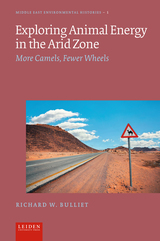101 books about Grammar & Punctuation and 5
start with E
101 books about Grammar & Punctuation and 5
101 books about Grammar & Punctuation
5 start with E start with E
5 start with E start with E

The Empirical Base of Linguistics
Grammaticality Judgments and Linguistic Methodology
Carson T. Schütze
University of Chicago Press, 1996
Grammaticality judgments—intuitions about the well-formedness of sentences—often rest on subtle discriminations that are notoriously unstable and unreliable. Carson T. Schütze presents a detailed critical overview of the vast literature on the nature and utility of grammaticality judgments and other linguistic intuitions, and the ways they have been used in linguistic research. He shows how variation in the judgment process can arise and assesses the status of judgments as reliable indicators of a speaker's grammar.
Integrating substantive and methodological findings, Schütze proposes a model in which judgments result from interactions of linguistic competence with general cognitive processes, and offers practical suggestions about collecting more useful data. The result is a work of importance to linguists, cognitive psychologists, and philosophers of language alike.
Integrating substantive and methodological findings, Schütze proposes a model in which judgments result from interactions of linguistic competence with general cognitive processes, and offers practical suggestions about collecting more useful data. The result is a work of importance to linguists, cognitive psychologists, and philosophers of language alike.
[more]
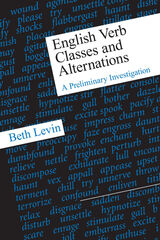
English Verb Classes and Alternations
A Preliminary Investigation
Beth Levin
University of Chicago Press, 1993
In this rich reference work, Beth Levin classifies over 3,000 English verbs according to shared meaning and behavior. Levin starts with the hypothesis that a verb's meaning influences its syntactic behavior and develops it into a powerful tool for studying the English verb lexicon. She shows how identifying verbs with similar syntactic behavior provides an effective means of distinguishing semantically coherent verb classes, and isolates these classes by examining verb behavior with respect to a wide range of syntactic alternations that reflect verb meaning.
The first part of the book sets out alternate ways in which verbs can express their arguments. The second presents classes of verbs that share a kernel of meaning and explores in detail the behavior of each class, drawing on the alternations in the first part. Levin's discussion of each class and alternation includes lists of relevant verbs, illustrative examples, comments on noteworthy properties, and bibliographic references. The result is an original, systematic picture of the organization of the verb inventory.
Easy to use, English Verb Classes and Alternations sets the stage for further explorations of the interface between lexical semantics and syntax. It will prove indispensable for theoretical and computational linguists, psycholinguists, cognitive scientists, lexicographers, and teachers of English as a second language.
The first part of the book sets out alternate ways in which verbs can express their arguments. The second presents classes of verbs that share a kernel of meaning and explores in detail the behavior of each class, drawing on the alternations in the first part. Levin's discussion of each class and alternation includes lists of relevant verbs, illustrative examples, comments on noteworthy properties, and bibliographic references. The result is an original, systematic picture of the organization of the verb inventory.
Easy to use, English Verb Classes and Alternations sets the stage for further explorations of the interface between lexical semantics and syntax. It will prove indispensable for theoretical and computational linguists, psycholinguists, cognitive scientists, lexicographers, and teachers of English as a second language.
[more]
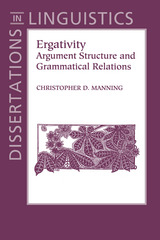
Ergativity
Argument Structure and Grammatical Relations
Christopher D. Manning
CSLI, 1996
This volume considers and examines some of the phenomena that have led languages to be considered 'ergative'. Languages considered 'ergative' have only been sparsely studied, and many fundamental questions in their analysis seem at best incompletely answered. This volume fills that void by focussing on some of the basic issues: when ergativity should be analyzed as syntactic or morphological; whether languages can be divided into two classes of syntactically and morphologically ergative languages, and if so where the division should be drawn; and whether ergative arguments are always core roles or not.
Christopher Manning's codification of syntactic approaches to dealing with ergative languages is based on a hypothesis he terms the 'Inverse Grammatical Relations hypothesis.' This hypothesis adopts a framework that decouples prominence at the levels of grammatical relations and argument structure. The result is two notions of subject: grammatical subject and argument structure subject and a uniform analysis of syntactically ergative and Philippine languages. These language groups, the syntactically ergative and Philippine languages, allow an inverse mapping in the prominence of the two highest terms between argument structure and grammatical relations. A level of argument structure is shown to be particularly well motivated by the examination of syntactically ergative languages. A study of Inuit, Tagalog, and Dyirbal shows that constraints on imperative addressee and controllee selection, antecendent of anaphors, and the controller of certain adverbial clauses are universally sensitive to argument structure. Thus, these phenomena are always accusative or neutral, explaining why passive agents and causes can generally bind reflexives. However, constraints on relativization, topicalization, focussing or questioning, specificity or wide scope, coreferential omission in coordination, etc. are shown to be universally sensitive to grammatical relations. Examining just these phenomena, which are sensitive to grammatical relations, it becomes evident that many languages are indeed syntactically ergative, and so must be countenanced by linguistic theory.
This volume combines good scholarship with innovative ideas into an important work that will appeal to a wide range of linguists and scholars.
[more]
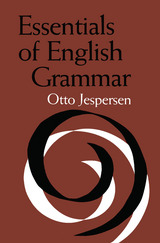
Essentials of English Grammar
Otto Jespersen
University of Alabama Press, 1964
A classic of English grammar, Essentials of English Grammar provides a common ground for the traditionalist and the structural or descriptive linguist. Jespersen’s work provides insight into the fundamental concepts that underlie the linguistic approach, but at the same time the foundation of the traditional approach is retained.
[more]
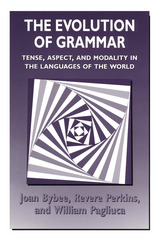
The Evolution of Grammar
Tense, Aspect, and Modality in the Languages of the World
Joan Bybee, Revere Perkins, and William Pagliuca
University of Chicago Press, 1994
Joan Bybee and her colleagues present a new theory of the evolution of grammar that links structure and meaning in a way that directly challenges most contemporary versions of generative grammar. This study focuses on the use and meaning of grammatical markers of tense, aspect, and modality and identifies a universal set of grammatical categories. The authors demonstrate that the semantic content of these categories evolves gradually and that this process of evolution is strikingly similar across unrelated languages.
Through a survey of seventy-six languages in twenty-five different phyla, the authors show that the same paths of change occur universally and that movement along these paths is in one direction only. This analysis reveals that lexical substance evolves into grammatical substance through various mechanisms of change, such as metaphorical extension and the conventionalization of implicature. Grammaticization is always accompanied by an increase in frequency of the grammatical marker, providing clear evidence that language use is a major factor in the evolution of synchronic language states.
The Evolution of Grammar has important implications for the development of language and for the study of cognitive processes in general.
Through a survey of seventy-six languages in twenty-five different phyla, the authors show that the same paths of change occur universally and that movement along these paths is in one direction only. This analysis reveals that lexical substance evolves into grammatical substance through various mechanisms of change, such as metaphorical extension and the conventionalization of implicature. Grammaticization is always accompanied by an increase in frequency of the grammatical marker, providing clear evidence that language use is a major factor in the evolution of synchronic language states.
The Evolution of Grammar has important implications for the development of language and for the study of cognitive processes in general.
[more]
READERS
Browse our collection.
PUBLISHERS
See BiblioVault's publisher services.
STUDENT SERVICES
Files for college accessibility offices.
UChicago Accessibility Resources
home | accessibility | search | about | contact us
BiblioVault ® 2001 - 2024
The University of Chicago Press


